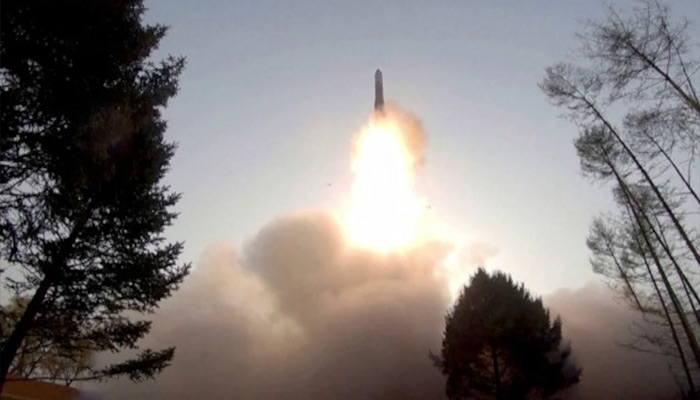South Korea, the United States and Japan staged joint naval missile defence exercises on Monday to improve responses to North Korean threats.
As Pyongyang accused Washington of ramping up “nuclear blackmail” with military drills. The three nations agreed at talks in Washington on Friday to hold regular missile defence and anti-submarine exercises in their efforts to boost diplomatic and military cooperation.
North Korea tested a new solid-fuel intercontinental ballistic missile (ICBM) on Friday that experts say would ease the way for missile launches with little warning, part of an increase in its military activities in recent weeks.
Hours after the trilateral exercises, Ri Pyong Chol, vice president of the North Korean ruling party’s Central Military Commission, issued a statement criticising the US for calling a UN Security Council meeting over its ICBM test.
The North’s weapons development was a self-defensive measure of defence against the US, Ri said. He accused Washington of raising regional tensions “to the brink of explosion” with military drills simulating a “pre-emptive nuclear strike and an all-out war” against the North.
The recent deployment of US strategic bombers was “clear evidence that the US nuclear threat and blackmail against us has reached a level that cannot be overlooked”, Ri said.
“If the US ignores our repeated warnings and continues actions that endanger the security environment of the Korean peninsula, we will take necessary action so that it feels a clearer security crisis and insurmountable threat,” he added.
US Ambassador to the UN Linda Thomas-Greenfield told the UN Security Council at Monday’s meeting: “Let me be clear, our lawful efforts to defend against the DPRK’s repeated escalatory actions do not in any way justify the DPRK’s unlawful behaviour.”
North Korea – formally known at the Democratic People’s Republic of Korea (DPRK) – has been under UN sanctions for its missile and nuclear programs since 2006.
DEADLOCK
After years of unity, the 15-member UN Security Council is now deadlocked on how to deal with Pyongyang. The United States and several other members want the council to toughen sanctions on Pyongyang, but veto-powers Russia and China are opposed.
Russia’s UN Ambassador Vassily Nebenzia described the meeting on Monday as “unnecessary,” adding that it would “simply make the situation worse.” China’s UN Ambassador Zhang Jun said the situation on the Korean Peninsula was at a crossroads.
“The United States and its allies should stop provocative military exercises,” Zhang told Reuters. “The other thing, which is also very much urgent, is the resumption of dialogue.”
Monday’s drills in international waters between Korea and Japan bring together South Korea’s 7,600-tonne Aegis destroyer Yulgok Yi I, the U.S. guided-missile destroyer Benfold, and Japan’s Atago destroyer, also equipped with Aegis radar systems.
The effort focuses on mastering response procedures, from detection and tracking to information-sharing, by creating a virtual target in a scenario featuring a North Korean ballistic missile provocation, the South’s navy said.
Pyongyang has threatened “more practical and offensive” action as South Korean and U.S. forces have performed annual springtime exercises since March, some involving Japan, which the North has described as a rehearsal for nuclear war.
Separately, the air forces of South Korea and the United States are set to begin drills on Monday for a 12-day run.
Also on Monday, South Korea and Japan resumed “two-plus-two” talks of senior diplomatic and security officials in Seoul after a five-year halt, as their ties thaw after a years-long feud over issues of wartime history.
President Yoon Suk Yeol, who has pledged to move ties with Japan beyond the past, visited Tokyo in March for the first time in 12 years as South Korea’s leader.

